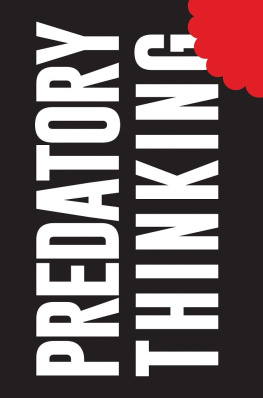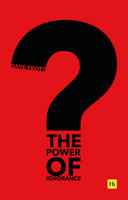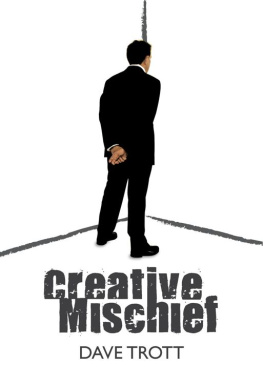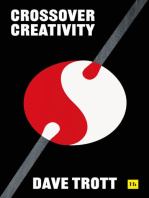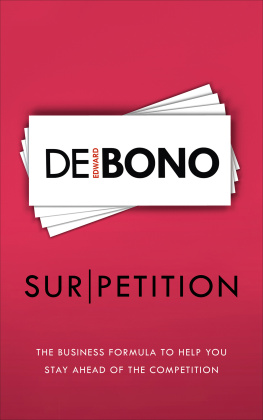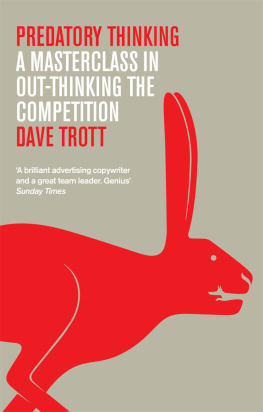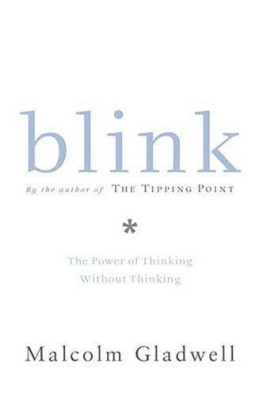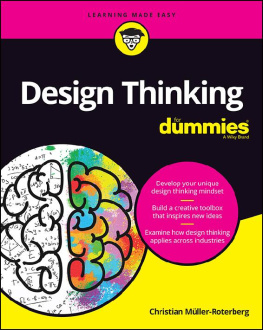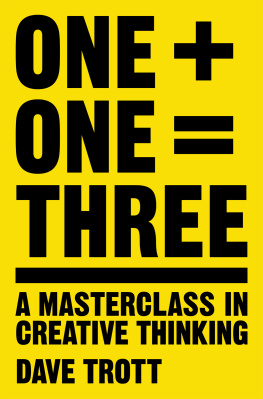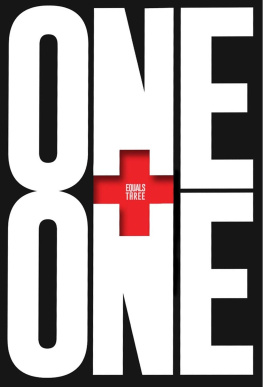Dave Trott - Predatory Thinking: A masterclass in out-thinking the competition
Here you can read online Dave Trott - Predatory Thinking: A masterclass in out-thinking the competition full text of the book (entire story) in english for free. Download pdf and epub, get meaning, cover and reviews about this ebook. year: 2013, publisher: Pan Macmillan, genre: Detective and thriller. Description of the work, (preface) as well as reviews are available. Best literature library LitArk.com created for fans of good reading and offers a wide selection of genres:
Romance novel
Science fiction
Adventure
Detective
Science
History
Home and family
Prose
Art
Politics
Computer
Non-fiction
Religion
Business
Children
Humor
Choose a favorite category and find really read worthwhile books. Enjoy immersion in the world of imagination, feel the emotions of the characters or learn something new for yourself, make an fascinating discovery.
- Book:Predatory Thinking: A masterclass in out-thinking the competition
- Author:
- Publisher:Pan Macmillan
- Genre:
- Year:2013
- Rating:3 / 5
- Favourites:Add to favourites
- Your mark:
- 60
- 1
- 2
- 3
- 4
- 5
Predatory Thinking: A masterclass in out-thinking the competition: summary, description and annotation
We offer to read an annotation, description, summary or preface (depends on what the author of the book "Predatory Thinking: A masterclass in out-thinking the competition" wrote himself). If you haven't found the necessary information about the book — write in the comments, we will try to find it.
Predatory Thinking: A masterclass in out-thinking the competition — read online for free the complete book (whole text) full work
Below is the text of the book, divided by pages. System saving the place of the last page read, allows you to conveniently read the book "Predatory Thinking: A masterclass in out-thinking the competition" online for free, without having to search again every time where you left off. Put a bookmark, and you can go to the page where you finished reading at any time.
Font size:
Interval:
Bookmark:
 CONTENTS INTRODUCTION:
CONTENTS INTRODUCTION:
WHY PREDATORY THINKING? Over the decades Ive worked in advertising, Ive learned one big lesson about creativity in particular and life in general. Nothing exists in limbo. Everything exists in context. Nothing is simply good or bad. Its either better or worse than the alternatives its compared to. And yet 90% of thinking ignores the context.
Which is why most thinking doesnt work. What works is out-thinking the problem. Faced with a problem you cant solve, get upstream and change the context. Change it to a problem you can solve. Henry Ford said, Theres no problem that cant be solved if you break it down into small enough pieces. So get upstream and break it into smaller pieces and see which piece is the pressure point.
Which piece can be changed, that changes everything else. Ive never learned much from textbooks. I find them dull. The sort of books that break things down into a dry-as-dust formula. The 8 truths, or the 12 principles, or the 10 essential thoughts. Rules you forget almost immediately.
For me, thats not interesting, thats not creative, thats not thinking. One of my advertising heroes, Bill Bernbach, said, Principles endure, formulas dont. Lessons that you work out for yourself are much more powerful than rules you memorize parrot-fashion. They stay with you. Thats why this book is a series of stories instead of a list of rules. Stories that have influenced me, and that Ive learned predatory thinking from.
Examples in as many different areas as possible. That way, youll learn the principles and apply them for yourself, in ways I might never even have thought of. And that is the whole point of predatory thinking. PART ONE CREATIVE IS AN ADJECTIVE NOT A NOUN The creativity of mischief Theres a story I love about an ex-student of mine. He was very talented, very creative and turned into a good copywriter. He did some nice ads and got a job at a leading agency.
The CEO of this agency was rich and famous. He noticed that Charlie Saatchi was into modern art. This piqued his interest. And he decided to get into modern art too. So he visited all the galleries and saw lots of modern art. Eventually he found a large piece he liked.
It was an acrylic painting, made up of lots of small, brightly coloured squares. He had it hung, in pride of place, in his office. It was very impressive. My ex-student was thinking about this one night after work in the pub. When everyone else had gone home, he went back to the agencys production office. He took a Pantone book and a pair of scissors.
A Pantone book is made up of little swatches of every colour there is. He took this book to the CEOs office. He held it up to the painting against the coloured squares. Then he cut out some exactly matched squares from the Pantone book. And he laid them on the carpet at the bottom of the picture. Then he went home.
The next morning the CEO went into his office. He stood admiring his new piece of modern art. He called in his PA and pointed out to her the finer points of its artistic merit. Then she asked, What are those squares on the floor? He picked them up and examined them. They were exactly the size and colour of the ones in his painting. He said to his PA, Get the art dealer who sold me this painting on the phone.
He said to the dealer, Look, Ive got a bit of a problem with this painting you sold me. The art dealer asked what it was. Controlling his anger, he said, Some of the little squares have started falling off. The dealer said that wasnt possible. The CEO yelled, Dont tell me its not bloody possible, Im sitting here holding them. The dealer said, Im sorry, but that cant happen.
Thats an acrylic painting. The squares cant fall off, theyre painted on. The CEO went quiet. Gradually the penny dropped. He put the phone down. This was embarrassing.
Hed been humiliated in front of his art dealer and his PA. And subsequently, the CEO stopped collecting modern art. And my ex-student didnt wait to get fired. He found himself another job. I thought what he did was very creative. And what made it so creative was the simplicity.
The understatement. He didnt do, or say, anything. He just left some little bits of coloured paper on the floor. And let imagination do the rest. I think we can learn a lot about the way the mind works from that. And the human mind is our medium.
The Ship of Theseus Plutarch used a conundrum to illustrate how the human mind works. The Ship of Theseus was built to travel to the furthest points of the known world. During the voyage it was tossed around by storms, battered by wind and waves. Sails had to be replaced. Ropes had to be replaced. The planks in the hull, even the nails holding them, had to be replaced.
By the time the ship returned, not a single piece of it was made from the original material. So, could that ship still be considered the real Ship of Theseus? Some people thought not. Because not one atom remained from the one that left port. In which case, when did it stop being the Ship of Theseus? When the first piece of wood was replaced? Surely not, thats just a minor repair. OK, how about the second, third or fourth repair? When there isnt one original plank left, is it still the Ship of Theseus? Hmmm, probably not. OK, when does it change, when does it lose its identity? Some people said it never lost its identity.
It was still the Ship of Theseus. It had just restored itself bit by bit. The basic concept hadnt altered. In which case, what was the Ship of Theseus? Was it just an idea? That couldnt be true either, because you could see it and touch it. So what was the actual Ship of Theseus? Two thousand years later the philosopher Thomas Hobbes took it further. He said, assume the crew of the Ship of Theseus didnt throw any of the old parts away.
As they replaced them, they stowed them in the hold. Then, when they got home, they unloaded them in a big pile on the dock. Splintered planks, bent and rusty nails, frayed ropes, torn and faded sails. Now, which one is the real Ship of Theseus? The beautiful ship that looks exactly the way it did when it left? (Although not a single atom of the original ship remains.) Or the rusted, rotting pile of junk that looks nothing like a ship? (But every atom of it is made up of the original Ship of Theseus.) There isnt an easy answer. But most of us would choose the thing that looks like the Ship of Theseus. At least it floats; it looks and behaves like a ship.
The alternative, the pile of wood and metal and cloth, doesnt do anything. Without a mind to envision a ship, to build a ship, to use it as a ship, there isnt a ship. It needed a mind to think up the concept of a ship. Then the mind shaped matter to fit the concept. And then the ship existed. And thats what creativity is.
Having an idea for something that doesnt exist. Then shaping matter to make it exist. Concepts arent sitting around waiting to be discovered. We have to create concepts, in our minds. Then we have to make the concept real, out of matter. Only then does it exist.
Creativity is creating something out of nothing. The power of ignorance A few years back, our phone bill was way higher than usual. I checked through it and one call alone cost 60. The children were too tiny to use the phone. Our little boy was about four and our little girl was about six. That left me, my wife Cathy and the nanny.
I knew it wasnt me, and they both swore it wasnt them. So Cathy called BT to check. The operator checked the number. She said it was a phone call that had lasted about two hours. Cathy said, Thats ridiculous. No one here has made a call that long.
She asked what the number was. The operator said, Its an 0900 number, madam, the sort they use for chat lines. Cathy said, Chat lines? The woman said, Yes, madam, have you had a word with your husband? Sometimes men use these lines and... er... forget to mention it to their wives. Cathy put the phone down and asked me if Id forgotten to mention it.
Next pageFont size:
Interval:
Bookmark:
Similar books «Predatory Thinking: A masterclass in out-thinking the competition»
Look at similar books to Predatory Thinking: A masterclass in out-thinking the competition. We have selected literature similar in name and meaning in the hope of providing readers with more options to find new, interesting, not yet read works.
Discussion, reviews of the book Predatory Thinking: A masterclass in out-thinking the competition and just readers' own opinions. Leave your comments, write what you think about the work, its meaning or the main characters. Specify what exactly you liked and what you didn't like, and why you think so.

